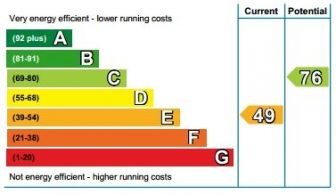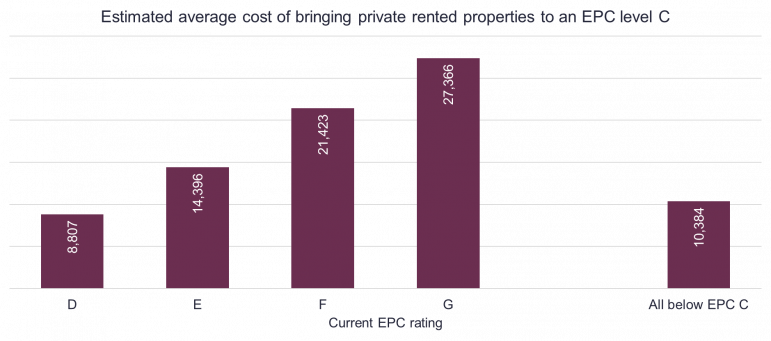 More than half of all homes in the UK’s private rented sector need upgrading to hit the target EPC C or above energy rating by 2028, new analysis from Savills suggests.
More than half of all homes in the UK’s private rented sector need upgrading to hit the target EPC C or above energy rating by 2028, new analysis from Savills suggests.
Legislation requiring all rental properties to have an energy performance certificate (EPC) rating of C or above will require upgrades to around 2.9 million privately rented homes.
Landlords could face an estimated total bill of £30bn to bring homes up to this standard, the firm says, although this could be capped at £25bn if the government were to impose a limit of £10,000 per property, as has been proposed.
Currently, across England and Wales there is a minimum EPC requirement of E. That was set to be lifted to a minimum EPC C by 2028, though this looks like it will now be pushed back. Savills research estimates that over half the total 5.7 million homes in the private rental sector will need to be upgraded, if as and when these regulations see the light of day.
Lucian Cook, Savills head of residential research, said: “This analysis underscores the enormity of the challenge facing the private rented sector at a time when many landlords struggle to cover their costs.

“If the programme to introduce these changes is pushed back, it will reduce some of the immediate financial pressure on landlords and give them more time to plan works effectively. However, current mortgage costs and the end of assured shorthold tenancies are still likely to cause some buy to let investors to re-evaluate their position, constraining supply and adding to upward pressure on rents.”
Half (51%) of the 728,138 EPC certificates issued for homes in the private rented sector in 2021-2022 remained below EPC level C, down from 73% of PRS housing stock in 2016-2017.
But the bulk of the problem remains with older housing stock. More than two-thirds (71%) of homes built before 1950 were granted an EPC below C in 2021-22, whereas just 12% of private rented sector property built post-1995 require improvements.
Savills analysis of EPC recommendations reveals that the cost of fully upgrading properties to a maximum EPC C ranges from £8,807 for a property that is currently an EPC D, to £27,366 for a property currently rated an EPC G.
Cook continued: “Funding these works will be challenging. Low cost options such as low energy lighting and installing heating thermostats have been fairly widely adopted. The cost of big-ticket items, such as solar PV and heating, solid wall and solid floor insulation remain to be significant barriers to further improvement in many cases.
“Not only are more pre-war homes in the private rented in need of upgrade, but these properties require more expenditure to bring them up to EPC C. We estimate that there are around 1.8 million of them requiring work and that they need around £22.5bn of investment, albeit landlord’s actual exposure will be reduced by the proposed cost cap.”



Here is a prediction. If they continue down this road, properties requiring substantial cost in excess of £3k will get their tenants out and sell up.
Put that into the context that air source heat pumps cost £10k and external or interval insulation for solid brick/stone properties will exceed minimum of £5K (not including restructure of fittings). There is no money to be made staying in PRS and if you have a BTL mortgage with increasing interest rates …… you’re nuked.
Don’t go down this route, don’t, don’t ,DON’T.
You must be logged in to like or dislike this comments.
Click to login
Don't have an account? Click here to register
This statement applies to about the same percentage of owner occupied homes but nobody dare lean on them. The houses that will need the most spending to upgrade are older lower value terraces on lower rents that make up a huge chuck of the rental market. Upgrading these does not make economic sense. The upgrade cost is a significant proportion of the house value and will not be recoverable on a sale and even if (a big if) the landlord can fund the upgrade it will take years to recover via rent. These places will be the first to be sold, disadvantaging the poorest tenants.
You must be logged in to like or dislike this comments.
Click to login
Don't have an account? Click here to register
Getting the PRS to EPC C seems ridiculous, yet is the low hanging fruit on the incrementalist road to utopia. And all they can manage to do is keep briefing about it, showing footage of fires in Greece, and pretending they are serious. After the PRS has gone, the UK cannot retain its seat at top table while home owners are free to make their own choices about insulation and the such. Such nuts must be cracked. The SNP are testing the waters. Sooner or later they will be building camps. Surely it couldn’t happen in the UK, could it?
You must be logged in to like or dislike this comments.
Click to login
Don't have an account? Click here to register
The problem in the PRS is dwarfed by that in the social housing sector. The appalling condition of many of the properties owned by L&Q Housing Association, is a very large tip of the iceberg.
You must be logged in to like or dislike this comments.
Click to login
Don't have an account? Click here to register